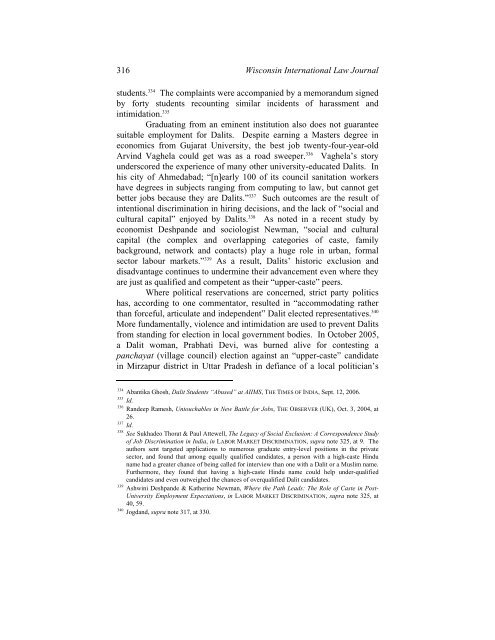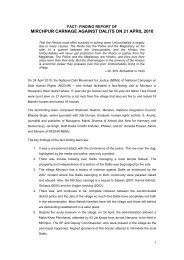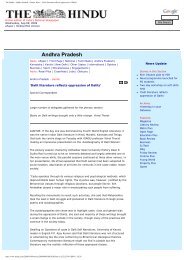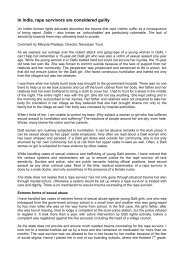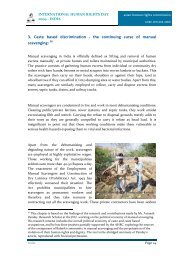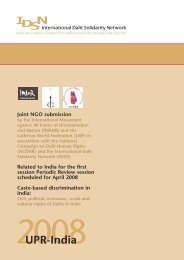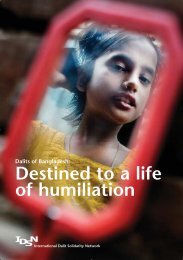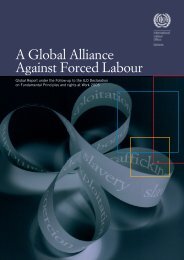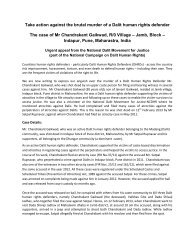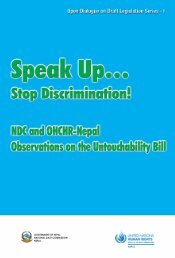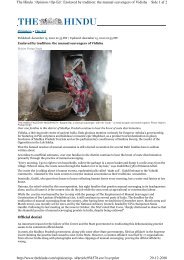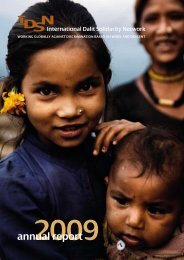316 Wisconsin <strong>International</strong> Law Journalstudents. 334 The complaints were accompanied <strong>by</strong> a memorandum signed<strong>by</strong> forty students recounting similar incidents of harassment andintimidation. 335Graduating from an eminent institution also does not guaranteesuitable employment for <strong>Dalit</strong>s. Despite earning a Masters degree ineconomics from Gujarat University, the best job twenty-four-year-oldArvind Vaghela could get was as a road sweeper. 336 Vaghela’s storyunderscored the experience of many other university-educated <strong>Dalit</strong>s. Inhis city of Ahmedabad; “[n]early 100 of its council sanitation workershave degrees in subjects ranging from computing to <strong>law</strong>, but cannot getbetter jobs because they are <strong>Dalit</strong>s.” 337 Such outcomes are the result ofintentional discrimination in hiring decisions, and the lack of “social andcultural capital” enjoyed <strong>by</strong> <strong>Dalit</strong>s. 338 As noted in a recent study <strong>by</strong>economist Deshpande and sociologist Newman, “social and culturalcapital (the complex and overlapping categories of <strong>caste</strong>, familybackground, network and contacts) play a huge role in urban, formalsector labour markets.” 339 As a result, <strong>Dalit</strong>s’ historic exclusion anddisadvantage continues to undermine their advancement even where theyare just as qualified and competent as their “upper-<strong>caste</strong>” peers.Where political reservations are concerned, strict party politicshas, according to one commentator, resulted in “accommodating ratherthan forceful, articulate and independent” <strong>Dalit</strong> elected representatives. 340More fundamentally, violence and intimidation are used to prevent <strong>Dalit</strong>sfrom standing for election in local government bodies. In October 2005,a <strong>Dalit</strong> woman, Prabhati Devi, was burned alive for contesting apanchayat (village council) election against an “upper-<strong>caste</strong>” candidatein Mirzapur district in Uttar Pradesh in defiance of a local politician’s334 Abantika Ghosh, <strong>Dalit</strong> Students “Abused” at AIIMS, THE TIMES OF INDIA, Sept. 12, 2006.335 Id.336 Randeep Ramesh, Untouchables in New Battle for Jobs, THE OBSERVER (UK), Oct. 3, 2004, at26.337 Id.338 See Sukhadeo Thorat & Paul Attewell, The Legacy of Social Exclusion: A Correspondence Studyof Job Discrimination in India, in LABOR MARKET DISCRIMINATION, supra note 325, at 9. Theauthors sent targeted applications to numerous graduate entry-level positions in the privatesector, and found that among <strong>equal</strong>ly qualified candidates, a person with a high-<strong>caste</strong> Hinduname had a greater chance of being called for interview than one with a <strong>Dalit</strong> or a Muslim name.Furthermore, they found that having a high-<strong>caste</strong> Hindu name could help under-qualifiedcandidates and even outweighed the chances of overqualified <strong>Dalit</strong> candidates.339 Ashwini Deshpande & Katherine Newman, Where the Path Leads: The Role of Caste in Post-University Employment Expectations, in LABOR MARKET DISCRIMINATION, supra note 325, at40, 59.340 Jogdand, supra note 317, at 330.
Vol. 26, No. 2 Equal <strong>by</strong> Law, Un<strong>equal</strong> <strong>by</strong> Caste 317warning not to contest. 341 Those <strong>Dalit</strong>s who are in positions of publicoffice are also often unable to properly discharge their public functionsdue to intimidation, threats, and physical violence at the hands of “upper<strong>caste</strong>”community members. 342Additionally, <strong>Dalit</strong>s who convert to Christianity or Islam losetheir “scheduled <strong>caste</strong>” status and the few benefits it affords. While theConstitution of India grants certain constitutional rights to Hindu,Buddhist, and Sikh <strong>Dalit</strong>s, the same benefits do not extend to <strong>Dalit</strong>s whoconvert to Christianity or Islam, even though they are ultimately unableto escape their discriminatory treatment as “untouchables.” At thiswriting, a petition challenging the constitutional validity of the 1950Presidential Order limiting reservations to Hindu, Buddhist, and Sikhscheduled <strong>caste</strong>s was pending before the Supreme Court. 343Despite the obvious problems associated with the effectiveimplementation of reservations, <strong>equal</strong>ity on paper has helped usher in anew conservative discourse. Fueled <strong>by</strong> proposals to introducereservations in the private sector and expand the scope of reservations inhigher education, such a discourse skips the step of situating reservationsin the context of the social and un<strong>equal</strong> reality that <strong>Dalit</strong>s face, andmoves straight to critiquing the continued “privileging” of particulargroups on the basis of their <strong>caste</strong> as a mechanism that reinforcesdifference. 344341 <strong>Dalit</strong> Woman Burnt Alive for Contesting Panchayat Elections, HINDUSTAN TIMES, Oct. 23,2005. In June 1997, <strong>Dalit</strong> leaders elected to the Melavalavu panchayat in Tamil Nadu weremurdered <strong>by</strong> members of the higher-<strong>caste</strong> Thevar community, signaling that the ceding of powerwould not be tolerated <strong>by</strong> those displaced from their positions on the council. BROKEN PEOPLE,supra note 21, at 90. Thevars also threatened <strong>Dalit</strong>s with economic sanctions should any of themfile for the position of panchayat president, a sanction that would effectively leave <strong>Dalit</strong>s withoutemployment or access to economic or social services in villages in that area. Id. at 91.342 Asian Human Rights Commission, <strong>Dalit</strong> Village Head Faces Constant Intimidation Due to CasteDiscrimination in Uttar Pradesh, Nov. 22, 2006, http://www.ahrchk.net/ua/mainfile.php/2006/2086 (last visited Aug. 16, 2008).343 Notice to Centre on Plea for Quota for <strong>Dalit</strong> Muslims, THE HINDU, Jan. 27, 2008, available athttp://www.hindu.com/2008/01/27/stories/2008012753950900.htm (last visited Aug. 16, 2008).The state government of Tamil Nadu passed a bill in 2007 to provide a seven percent quota forChristian and Muslim <strong>Dalit</strong>s, to be carved out of the existing 30 percent reservations for OBCs.Dominic Emmanuel, <strong>Dalit</strong> Christians too Need Reservations, THE TRIBUNE, Dec. 25, 2007,available at http://www.tribuneindia.com/2007/20071225/edit.htm (last visited Aug. 16, 2008).344 See also SATISH DESHPANDE, Caste In<strong>equal</strong>ities in India Today, in CONTEMPORARY INDIA: ASOCIOLOGICAL VIEW 101 (2003) (arguing that proposals to expand affirmative action policies inIndia today elicit discussion of the possible consequences of their implementation, instead of firstasking: “Is <strong>caste</strong> discrimination still practiced in contemporary India? Does it continue to breedin<strong>equal</strong>ity? What is the nature and extent of such in<strong>equal</strong>ity today? How has it been changingsince independence?”).
- Page 1 and 2:
EQUAL BY LAW, UNEQUAL BY CASTE: THE
- Page 3 and 4:
Vol. 26, No. 2 Equal by Law, Unequa
- Page 5 and 6:
Vol. 26, No. 2 Equal by Law, Unequa
- Page 7 and 8:
Vol. 26, No. 2 Equal by Law, Unequa
- Page 9 and 10:
Vol. 26, No. 2 Equal by Law, Unequa
- Page 11 and 12: Vol. 26, No. 2 Equal by Law, Unequa
- Page 13 and 14: Vol. 26, No. 2 Equal by Law, Unequa
- Page 15 and 16: Vol. 26, No. 2 Equal by Law, Unequa
- Page 17 and 18: Vol. 26, No. 2 Equal by Law, Unequa
- Page 19 and 20: Vol. 26, No. 2 Equal by Law, Unequa
- Page 21 and 22: Vol. 26, No. 2 Equal by Law, Unequa
- Page 23 and 24: Vol. 26, No. 2 Equal by Law, Unequa
- Page 25 and 26: Vol. 26, No. 2 Equal by Law, Unequa
- Page 27 and 28: Vol. 26, No. 2 Equal by Law, Unequa
- Page 29 and 30: Vol. 26, No. 2 Equal by Law, Unequa
- Page 31 and 32: Vol. 26, No. 2 Equal by Law, Unequa
- Page 33 and 34: Vol. 26, No. 2 Equal by Law, Unequa
- Page 35 and 36: Vol. 26, No. 2 Equal by Law, Unequa
- Page 37 and 38: Vol. 26, No. 2 Equal by Law, Unequa
- Page 39 and 40: Vol. 26, No. 2 Equal by Law, Unequa
- Page 41 and 42: Vol. 26, No. 2 Equal by Law, Unequa
- Page 43 and 44: Vol. 26, No. 2 Equal by Law, Unequa
- Page 45 and 46: Vol. 26, No. 2 Equal by Law, Unequa
- Page 47 and 48: Vol. 26, No. 2 Equal by Law, Unequa
- Page 49 and 50: Vol. 26, No. 2 Equal by Law, Unequa
- Page 51 and 52: Vol. 26, No. 2 Equal by Law, Unequa
- Page 53 and 54: Vol. 26, No. 2 Equal by Law, Unequa
- Page 55: Vol. 26, No. 2 Equal by Law, Unequa
- Page 58 and 59: 312 Wisconsin International Law Jou
- Page 60 and 61: 314 Wisconsin International Law Jou
- Page 64 and 65: 318 Wisconsin International Law Jou
- Page 66 and 67: 320 Wisconsin International Law Jou
- Page 68 and 69: 322 Wisconsin International Law Jou
- Page 70 and 71: 324 Wisconsin International Law Jou
- Page 72 and 73: 326 Wisconsin International Law Jou
- Page 74 and 75: 328 Wisconsin International Law Jou
- Page 76 and 77: 330 Wisconsin International Law Jou
- Page 78 and 79: 332 Wisconsin International Law Jou
- Page 80 and 81: 334 Wisconsin International Law Jou
- Page 82 and 83: 336 Wisconsin International Law Jou
- Page 84 and 85: 338 Wisconsin International Law Jou
- Page 86 and 87: 340 Wisconsin International Law Jou
- Page 88 and 89: 342 Wisconsin International Law Jou


